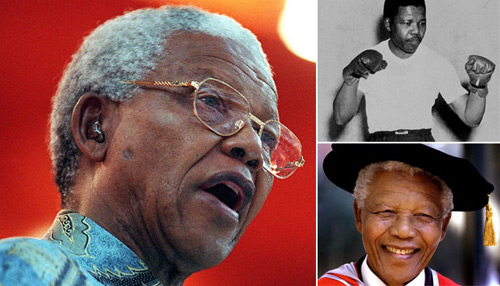當前位置: Language Tips> 雙語新聞
Nelson Mandela: Six things you didn’t know
分享到

|
Nelson Mandela was a figure of international renown, and many details of his life and career were public knowledge. But here are six things you may not have known about the late South African leader. 1. He was a boxing fan. In his youth, Nelson Mandela enjoyed boxing and long-distance running. Even during the 27 years he spent in prison, he would exercise every morning. "I did not enjoy the violence of boxing so much as the science of it. I was intrigued by how one moved one's body to protect oneself, how one used a strategy both to attack and retreat, how one paced oneself over a match," he wrote in his autobiography Long Walk to Freedom. "Boxing is egalitarian. In the ring, rank, age, colour and wealth are irrelevant... I never did any real fighting after I entered politics. My main interest was in training; I found the rigorous exercise to be an excellent outlet for tension and stress. After a strenuous workout, I felt both mentally and physically lighter," he wrote. Among the memorabilia in the Mandela Family Museum in Soweto, visitors can find the world championship belt given to Mandela by American boxer Sugar Ray Leonard. 2. His original name was not Nelson. Rolihlahla Mandela was nine years old when a teacher at the primary Methodist school where he was studying in Qunu, South Africa, gave him an English name - Nelson - in accordance with the custom to give all school children Christian names. This was common practice in South Africa and in other parts of the continent, where a person could often be given an English name that foreigners would find easier to pronounce. Rolihlahla is not a common name in South Africa. It is Xhosa, one of the 11 official languages in the country, spoken by about 18% of the population. It literally means "pulling the branch of a tree", but its colloquial meaning is "troublemaker". His circumcision name was Dalibunga, meaning "founder of the Bunga", the traditional ruling body of the Transkei - the rural area where he was born. "To Xhosa traditionalists, this name is more acceptable than either of my two previous given names," he wrote in his autobiography. However, in South Africa, Mr Mandela was often called by his clan name - Madiba - which South Africans used out of respect. 3. He was on a US terror watch list until 2008. Prior to that, along with other former ANC leaders, Mr Mandela was only able to visit the US with special permission from the secretary of state, because the ANC had been designated a terrorist organisation by South Africa's former apartheid government. Ronald Reagan originally placed the ANC on the list in the 1980s. "It is frankly a rather embarrassing matter that I still have to waive in my own counterparts - the foreign minister of South Africa, not to mention the great leader, Nelson Mandela," then-Secretary of State Condoleezza Rice said in 2008. The bill scrapping the designation was introduced by Howard Berman, chairman of the House Committee on Foreign Affairs, who promised to "wipe away" the "indignity". 4. He forgot his glasses when he was released from prison. Mr Mandela's release on 11 February 1990 followed years of political pressure against apartheid. On the day, he was "astounded and a little bit alarmed", he recalled later. Mr Mandela's reading glasses stayed behind in prison Mr Mandela and his then-wife Winnie were taken to the centre of Cape Town to address a huge and euphoric crowd. But when he pulled out the text of his speech, he realised he had forgotten his glasses and had to borrow Winnie's. 5. He dressed up as a chauffeur to evade police. After going underground because of his ANC activities, Mr Mandela's ability to evade the securities services earned him the nickname "the black Pimpernel", after the novel The Scarlet Pimpernel, about a hero with a secret identity. A fake passport in the name of David Motsamayi used by Mr Mandela Mr Mandela is known to have disguised himself as a chauffeur, a gardener and a chef in order to travel around the country unnoticed by the authorities. Nobody seems to know how Mr Mandela, who had been operating underground with a false identity, was ultimately exposed and arrested. 6. He had his own law firm, but it took him years to get a law degree. Mr Mandela studied law on and off for 50 years from 1939, failing about half the courses he took. A two-year diploma in law on top of his university degree allowed him to practise, and in August 1952, he and Oliver Tambo established South Africa's first black law firm, Mandela and Tambo, in Johannesburg. He persevered to finally secure a law degree while in prison in 1989. |
納爾遜·曼德拉是國際知名人物,他生活和事業的許多細節為公眾所熟知。但這里提到的六件事可能是你對這位已故南非領導人并不了解的。 1. 他是個拳擊迷。 納爾遜·曼德拉年輕時就喜歡打拳擊和長跑。即便在被囚禁的27年歲月里,他每天早晨仍然堅持練習。 “我更喜歡拳擊的技巧而非暴力。我對如何移動身體保護自己、如何利用戰術進攻和后退、如何在比賽中把握自己的節奏感興趣,”他在自傳《 漫漫自由路》中寫道。 “拳擊是平等的。在比賽場上,等級、年齡、膚色和財富都沒有意義……我參與政治后從沒打過真正的比賽。我的主要興趣是在訓練中;我發現嚴格的鍛煉是釋放緊張和壓力的極好方式。高強度的訓練之后,我感到身心更輕松,”他寫道。 索韋托的曼德拉家族博物館保存著許多紀念物,參觀者會在其中發現一條拳擊世界冠軍的腰帶,這是美國拳擊名宿雷納德(Sugar Ray Leonard)贈予曼德拉的。 2. 他最初的名字不叫納爾遜,而是羅利赫拉赫拉·曼德拉(Rolihlahla Mandela )。 他九歲時在家鄉庫努的一所衛理公會小學就讀,是學校老師給他取了一個英文名字——納爾遜,為每名入學兒童起教名是當時的傳統。 在南非和非洲大陸其他地方,一個人常常被取一個外國人覺得容易發音的英文名字。 羅利赫拉赫拉在南非不是常見的名字,它來自科薩語,南非有11種官方語言,操科薩語的人口占18%。“羅利赫拉赫拉”的字面意思是“拉樹枝”,在口語中指“搗蛋鬼”。 他行割禮時取名“達理邦加(Dalibunga)”,意思是“邦加的建立者”,邦加是南非特蘭斯凱地區的統治組織,曼德拉就出生在這里。“比起我的前兩個名字,傳統的科薩人更接受這個名字,”他在自傳中說。但在南非,曼德拉先生常被按他的家族姓氏稱呼——曼德拉,南非人這么稱呼他是出于敬意。 3. 他的大名直到2008年一直列在美國恐怖分子觀察名單上。 在此之前,曼德拉像其他非洲民族議會領導人一樣,只能在獲得美國國務卿特許后訪問美國,原因是南非前種族隔離政府把非洲民族議會定名為恐怖組織。 上世紀八十年代,經里根總統同意,非洲民族議會被列入恐怖分子名單。 美國前國務卿賴斯在2008年說,“就連我對同等地位的南非外交部長做出讓步時都明顯感到尷尬,更不用說那位偉大的領袖曼德拉了。” 后來,是眾議院外交委員會主席霍華德·伯爾曼發起了廢除這一稱號的法案,他承諾要為非洲民族議會“抹去”這一“侮辱”。 4. 曼德拉被從監獄釋放時忘了帶眼鏡。 1990年2月11日,曼德拉獲釋,這是多年反種族隔離政治壓力的結果。后來他回憶說,他當天“既驚愕又有點警惕”。 曼德拉和他當時的妻子溫妮被帶到開普敦市中心,大群喜悅的民眾在那里等待他發言。他拿出演說稿時才發現忘了帶眼鏡,只好借了溫妮的眼鏡戴上。 5. 他曾穿上司機制服逃避警察。 非洲民族議會的活動遭到禁止后,他被迫轉入地下活動。曼德拉躲避治安部隊搜捕的能力為他贏得了“黑色繁箋花”的雅號,因為當時流行一部小說,《腥紅色的繁箋花》(Scarlet Pimpernel),書中的男主人公就是一位有著秘密身份的地下英雄。 眾所周知,他曾偽裝成司機、園丁和廚師,目的是在全國各地旅行時不引起當局的注意。似乎沒人知道為什么曼德拉最終暴露被捕,因為他一直利用假身份進行地下活動。 6. 盡管他擁有自己的律師事務所,但他花了半個世紀才獲得法學學位。 曼德拉自1939年開始學習法律,50年中時斷時續,有半數考試不及格。 他的最高大學學歷是一張兩年制的法學文憑,這讓他有資格開業從事律師工作,1952年8月,他與奧利弗·坦博在約翰內斯堡建立南非第一家黑人律師事務所,曼德拉坦博律師事務所。 他在監獄里堅持學習,于1989年最后獲得法學學位。 (譯者 sxdns717 編輯 丹妮) |
上一篇 : 圣誕佳節警惕12種騙局
下一篇 : 讓你在圣誕節“聰明購物”的13個小貼士
分享到
關注和訂閱


電話:8610-84883645
傳真:8610-84883500
Email: languagetips@chinadaily.com.cn